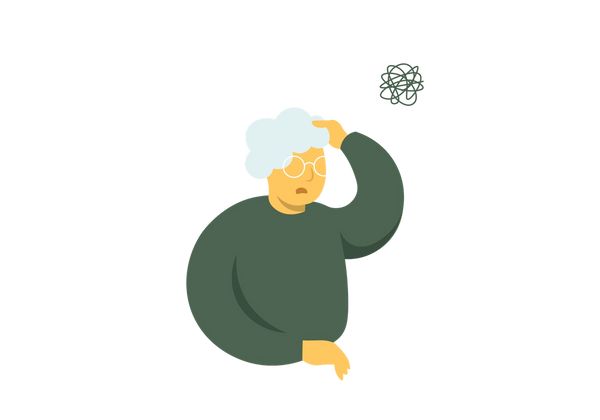What is dementia?
Dementia refers to memory loss, problem solving difficulties, and other types of mental decline that is often (but not always) associated with aging.
Many of us are in fear of getting dementia as we grow older. About 44% of adults ages 50 to 64 say they are worried about developing dementia. For those with a family history of the disease, the rate rises to 66%, according to the National Poll on Healthy Aging.
While family history plays a role in some cases of dementia, having a parent or sibling with dementia does not mean you’ll definitely develop it. Genetics is only one of several factors contributing to dementia.
Symptoms of dementia
Dementia is a decline in cognitive abilities, such as short-term memory, reasoning, language, problem-solving, and the ability to focus. It also causes behavioral changes. It usually gets progressively worse within 5 to 8 years.
Dementia is not, as many people believe, a normal part of aging.
There are 7 stages of dementia. The first three are considered pre-dementia. The last four are dementia.
As people progress through the later stages (4 through 7), they seem to become emotionally detached. They no longer can have a conversation and may not recognize close family members. They also lose the ability to do basic, everyday tasks like making meals, choosing clothes, and eventually bathing and dressing.
Pro Tip
It is normal to have some cognitive changes as you age (such as memory loss), but dementia is not a normal part of aging. If you think you might have dementia, make an appointment for a consultation sooner than later to learn what you can do to manage the symptoms as best you can. —Dr. Bobbi Wegner
Dementia causes
Pro Tip
Ask your doctor to help you understand the different types of dementia and how they fit with your symptom presentation. Ask why they think you might have dementia and what type. And get a second opinion to confirm the diagnosis. —Dr. Wegner
Dementia occurs when a significant number of brain cells (the neurons) no longer connect with one another, stop functioning, or die.
And it is not just one disease. It’s a general term for a number of conditions and disorders that lead to cognitive decline.
Alzheimer’s disease
The most common form of dementia, responsible for 60% to 80% of cases.
Alzheimer’s causes abnormal plaques, a buildup of certain proteins, which blocks signaling between neurons. It also causes tangles—twisted strands of protein. The tangles cut off the supply of nutrients to neurons.
Vascular dementia
A less common form of dementia is vascular dementia, which is caused by damage to blood vessels in the brain. It is usually from a stroke, multiple mini-strokes, or bleeding in the brain. Vascular dementia accounts for an estimated 5% to 10% of dementia cases.
Frontotemporal dementia
Frontotemporal dementia tends to occur in younger adults, between 45 and 65 years old. It accounts for another 5% to 10% of cases. It refers to the progressive loss of nerve cells in either the brain's frontal lobes (behind the forehead) or its temporal lobes (behind the ears).
There are several other conditions that may cause symptoms of dementia, such as thyroid issues and certain medications. These symptoms can be reversed when conditions are treated or medications are changed.
What kind of dementia is hereditary?
Dr. Rx
Just because your family member had dementia does not mean you will also get it. Although you are at higher risk, there are also a number of things you can do to lower your risk. Don’t smoke, get regular exercise, eat healthfully, manage health issues (like cardiac conditions and blood pressure), maintain regular social connection, and do activities that challenge your brain (like learning a new language or working on crossword puzzles). —Dr. Wegner
Researchers have identified several genes that increase the risk of Alzheimer’s, such as the APOE-e4 gene. An estimated 40% to 65% of those diagnosed with Alzheimer’s have this gene.
Vascular dementia is less likely to be influenced by genes. It is more likely linked to risk factors for heart disease like high blood pressure, being overweight, having a sedentary lifestyle, or diabetes.
About one in three of frontotemporal disorders may be hereditary.
What are the chances of getting dementia if a parent has it?
If a parent has Alzheimer’s disease, your lifetime risk increases by about 30%. But that may sound scarier than it is.
The lifetime risk of developing Alzheimer’s for a woman who is 55 years old is 17%. A 30% increased risk raises it to 22%. For men, the lifetime risk rises from 9% to almost 12%.
Those with close family members who developed Alzheimer’s disease before age 65 are at higher risk. However, early-onset Alzheimer’s is rare and accounts for a very small percentage of people with the disease.
Genetic testing for hereditary dementia
If you have or had a parent with Alzheimer’s disease, it’s usually not recommended that you get genetic testing.
Testing positive for the gene may not change your medical treatment. It also does not mean you will get Alzheimer’s. But it could create anxiety and stress and affect your quality of life.
So while genes may increase your risk, there are ways to decrease it, too. The best course of action to reduce your risk factors for cardiovascular disease, including high blood pressure, high cholesterol, and diabetes.
The Alzheimer’s Association’s guidelines include eating a healthy diet, maintaining a healthy weight, and exercising regularly. It’s also important to maintain social connections and keep your brain active by learning a new skill, finding a hobby, or taking a class.
Was this article helpful?
